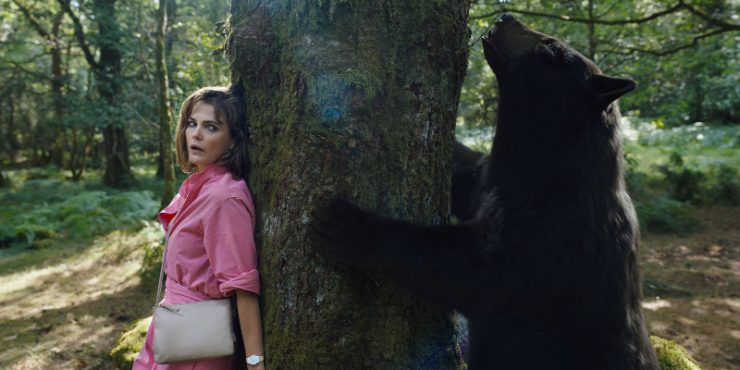Bad-on-purpose is, flatly, not my thing. Films that actively court the notoriety of a Mystery Science Theater 3000 episode always reek of desperation, an embarrassing attempt to reverse engineer cinematic infamy. Cocaine Bear is working within this tradition, and director Elizabeth Banks tries multiple strategies to get this ridiculous story off the ground (gory horror, broadest-of-broad comedy, domestic drama), and is a failure on all fronts. Its characters are slight, its violence is upsetting but also uninspired. Perhaps its worst sin: not even a single attempt at humor achieves anything in the way of laughter. Substituting “Well… THAT happened”-type reactions for well-crafted set-ups and punchlines, the jokes fall flat again and again, making the whole experience excruciating.
It’s a shame, especially with such unquestioned talent in the cast. There’s Keri Russell, who plays a nurse and mother, who runs into the forrest when she learns her rebellious daughter (Brooklyn Prince) has skipped school on the same day a maniacal bear is rampaging through the forest after getting into a pile of discarded cocaine. There’s also Ray Liotta, who plays the violent drug distributor whose cocaine ended up in the forest in the first place. Russell and the late Liotta are perhaps the only two actors in the movie who are not saddled with comedic obligation (playing both the moral center and the ruthless antagonist, respectively), and being so they are the only two performances that showcase what a good version of this movie may have looked like. They actually calculate the obvious danger of the situation before acting accordingly, while the rest of the characters use the situation as an opportunity for unearned ironic quips.
The rest of the cast includes Margot Martindale as a horny and incompetent park ranger, O’Shea Jackson Jr. as a frustrated drug dealer tasked with bringing his grieving fellow dealer (Alden Ehrenreich, still treading water in a career gone completely sideways) to Liotta, and Isiah Whitlock Jr. as a Tennessee police officer who travels to Georgia to catch them all. There’s also a group of teenagers wrecking their own havoc and an unlucky couple of first responders, who each have the unenviable destiny of coming face-to-face with the bear. Each storyline feels tireless and teased out, grasping desperately to get Cocaine Bear to feature length. Any non-Liotta characters that aren’t mauled are given contrived sympathy, as if even an inkling of moral complication is too much for the audience to comprehend. Even the film’s main event – a black bear power-fueled by cocaine – is said to, in the end, be a good guy, an innocent bystander and worried mother, who takes her cocaine mania and uses it to defeat the bad guys.
This is the first Elizabeth Banks directorial effort that I’ve ever seen. The actress is a proven comedic talent and always a joy to see on the screen. Behind the camera, she directs Cocaine Bear like a paycheck is burning a hole in her pocket. The tone is cynical and condescending. Little respect is paid to the audience’s expectation for entertainment or even a functioning narrative. The CGI bear is probably good enough, but all the levity that surrounds the bear’s star moments take the bite out (sorry) of anything that was hoped to be achieved. I did not anticipate an art house approach to this story, and part of the commercial appeal of Cocaine Bear is that expectations can be low. The floor on this premise should be high enough to at the very least make you smile at the absurdity. I was open to enjoying a bad movie here, but this film doesn’t hold up its end of the bargain. We get a cocaine bear, sure, but literally nothing else worth watching.
Directed by Elizabeth Banks










